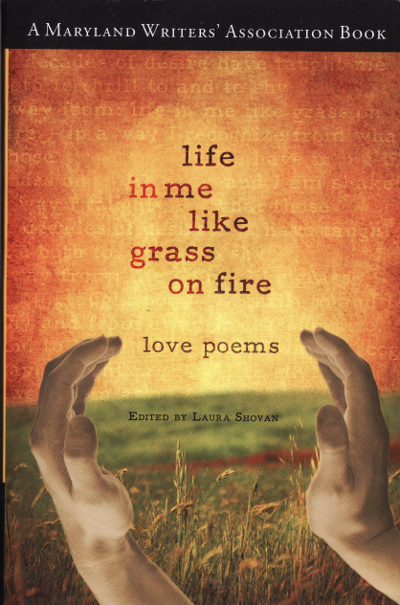Summer 2011
Table of Contents - Vol. VII, No. 2
Poetry Fiction NonFiction Reviews
Dan Cuddy
Life in Me Like Grass on Fire: Love Poems, an anthology edited by Laura Shovan, A Maryland Writers’ Association Book, 2011. ISBN-13: 978-0-9820032-1-3, 158 pages paperback $12.95 U.S. $13.95 CAN
Speaking as a reader of poetry, I think this anthology would be a good addition to any home library. The quality of the poems it contains is quite high. Some, such as Lalita Noronha’s “The Kiss” are almost minor masterpieces. Ms Noronha is an acclaimed fiction writer in the Maryland area but her talent for poetry may vie for attention as well. “The Kiss” is a well-sculpted poem of sensuous words that describes Rodin’s famous sculpture and a viewer’s reaction to it.
It’s the way your hand rests
On her
thigh,
Barely touches
Her buttock,
Your thumb poised above,
The
way she sits
Sideways astride between
Your legs opened wide.
And after an equally precise description of the woman’s embrace of the man, the viewer, a society of viewers, is addressed directly, and the poet speaks for all:
It’s how we know
What drove Adam and Eve from
Paradise,
Why
Paolo and Francesca left
The Gates of Hell
And why we stand
And
gaze,
And gaze.
This poem embodies both passion and art, and
illustrates the passion in art and the passion for art. The poet has created
a marvel to inhabit our mind’s eye.
John Hayes in another
poem in this collection, “The Rodin Show”, writes about The Kiss. It is
interesting to compare the two approaches. Hayes’ poem is accomplished as
well but it comes from a different angle. Ms Naronha speaks for us; Mr.
Hayes presents his (the narrator, the poet) reaction to the statue, and he
is self-conscious and speaks with humor and distancing:
The Kiss inhales
my sight.
I wonder
Do their tongues
Exchange saliva?
The poet also looks at another bronze, Young Woman’s torso. The reader watches him and a society of cultural mores interact:
I glide my fingers
Along
her curvature of hip.
A guard reacts
To this endearing touch.
Unceremoniously he escorts
Me from the room.
At the exit, I wave a
kiss
Into her parted lips.
Since sexual passion is an individual
thing, individuals and societies try to protect themselves from its
disruptive anarchy as it makes all of us and our supposed dignity,
self-possession and control ludicrous when we let our defenses down
and pursue it. The poet is wise to treat it with humor. The passion is there
but we sort of disown it in public, though we possess it and it possesses
us.
The anthology is ostensibly about Love but it
stretches the definition. It is divided into seven sections: 1. First
Love, Lost Love, 2. Love of Art and Work, 3.Friends and Family, 4.Love of
Nature, 5. Love Floods the Senses, 6. The Madness of Love, 7. Love as We
Age. Each section has an introduction by an individual editor. I will
leave it to future readers to read them.
I want to
discuss some of the poems in the collection that particularly struck me for
one reason or another. Barbara Diehl plays with and in received
traditional forms. Her “Sonnet for an Ex” is surprisingly good.
Sonnets in general have a bit of dust and mold in that their tradition was
popularized by the skills of Petrarch and Shakespeare and Milton, etc.
However, it would be difficult to find a sonnet more contemporary in sound
and subject than Ms. Diehl’s. I will quote it in its entirety because
it is a tour de force and example of how a traditional form can be adapted
to contemporary use, though you would need this poet’s talent to pull off
anything this successful.
The glamour of a little prison time,
The
drama of the draft board records burned,
The parties with John Waters and
Divine,
The thrill when the Mustang engine turned
And push-started
from Danville to Baltimore,
Our hippie home of actors, TV techs,
And
Vietnam vets, a revolving door
Of girls who wanted love and just got sex
From a cokehead drunk they romanticized,
Who rasped like Cash about the
life he’d lived---
And then the legal papers arrived,
The son you
fathered, checks you didn’t give---
I pass you by at touch points in your
life,
Like entourage friends, a peripheral ex-wife.
Amazing, yes?
The rhyme is just so natural, even when end-stopped. The rhymes are not
always exact but subtle in their sounds like “techs” and “sex”. Tex is an
exact rhyme for sex, not techs, but the difference is slight and it works
magnificently. There are also internal rhymes in the poem ---“rasped like
Cash”, and in the line between the techs-sex we have “vets”. Perhaps
to an experienced poet pointing out these masterful touches is elementary,
but, though it looks easy, the writing here is not easy. The diction
is contemporary. This is a far cry from the poetic speech of Keats’ day.
Keats was a 19th century poet and a great one. Barbara Diehl is a 21st
century poet and a darned good one. The poem has a contemporary tone
too----that scolding feminist bite, but it isn’t just some rallying of
wronged women. This poem is a delight to read. The put down of this
great-in-his-own-head man is done with entertaining restraint until the
final phrase that contains so much emotion in the ironic guillotine of its
words.
There is a poem by Margi Grady , “Ways of Talking to
Leaves” that is so tender and so sad. I will let readers discover it
in its entirety for themselves. It is such a beautiful and simple expression
of---yes, love. There is a short poem “Steamy Web” that is a delight written
by Eric D. Goodman. “If Then” by Deborah Edelman is a poem summing up the
outlines of a life and love. It is done with unexpected twists in its
narrative and the last stanza should affect anyone who reads it. Sue Ellen
Thompson’s “The Old Boyfriend” is a wondrous poem in the section
Love as We Age .
The poets of this collection may be
regional but the poetry isn’t. There are enough delights to read and reread
that I urge anyone who is or has been in love to get this book for their
personal library. A lot of poetry is being written today but much of it will
produce only a yawn from the average intelligent educated reader. This
anthology, so full of our human experience, communicates the fires, fierce
and/or gentle, that inspired its poets to write.
© Dan Cuddy

